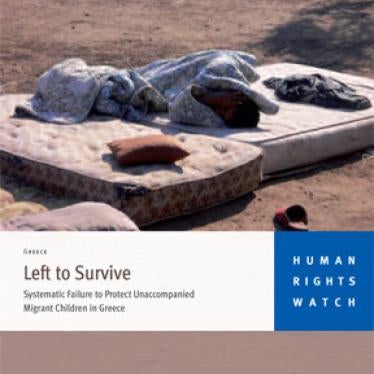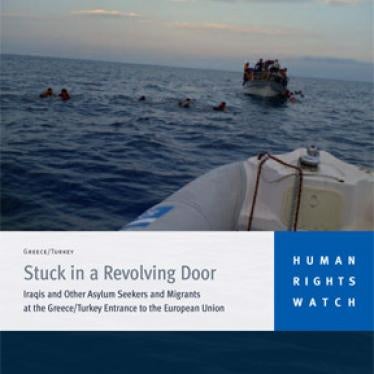Dear Mr. Pavlopoulos,
We are writing to raise serious concerns about the human rights implications of significant changes in the Greek asylum procedure-in particular the removal from the refugee law of the asylum appeals procedure for new cases-and the recent crackdown on migrants and the transfer of many of them to the north of Greece, raising fears of illegal expulsions to Turkey. We urge you to take immediate action to address these concerns, as detailed below.
Human Rights Watch received reports from a credible source that, in mid-July 2009, police transferred a group of Arabic-speaking people from Chios Island to the Evros border region, where some were secretly forced to cross the border into Turkey.
We have received numerous reports of large-scale police operations in Patras and in Athens targeted at migrant squatters' settlements. We recognize that Greek officials may legitimately control undocumented foreigners, but such operations must comply with Greece's international human rights obligations. We therefore urge you to conduct any sweeps with due regard to basic human rights and dignity, and ensure that all apprehended migrants are afforded the opportunity to file claims for asylum. We have interviewed many foreigners living in Greece who have been turned away or otherwise prevented from seeking asylum.
Most recently, on July 17, we observed more than 1,000 migrants standing in line throughout the night, trying, largely in vain, to file asylum applications at the Petrou Ralli police station. Generally, the authorities at Petrou Ralli choose about 300 asylum applicants per week and turn the rest away.
But even those asylum seekers who are able to lodge applications cannot be considered likely to have their rights protected, because the asylum approval rate last year was 0.05 percent in the first instance. With a slow-moving backlog of nearly 30,000 cases, there has been virtually no opportunity for refugees to find protection in Greece. And now, Presidential Decree 81/2009 abolishes a meaningful appeals procedure. With 99.95% of first instance asylum claims being rejected, abolishing appeals will make it nearly impossible for anyone to obtain refugee status.
In a November 2008 report, "Stuck in a Revolving Door: Iraqis and Other Asylum Seekers and Migrants at the Greece/Turkey Entrance to the European Union," Human Rights Watch documented how Greek authorities have systematically expelled migrants across the Greece-Turkey border, in violation of many international legal obligations. These "pushbacks" typically occur at night, with the migrants being taken from detention facilities in the northern part of the country, close to the Turkish border, and they involve considerable logistical preparation. Human Rights Watch at that time interviewed 41 asylum seekers and refugees - all privately and confidentially - in various locations in both Greece and Turkey, who gave consistent accounts of Greek authorities taking them to the Evros River at night and then forcing them across.
Human Rights Watch also documented how Greek authorities miscategorize unaccompanied children as adults and detain them for prolonged periods of time in conditions that could be considered inhuman and degrading. (See our December 2008 report, "Left to Survive: Systematic Failure to Protect Unaccompanied Migrant Children in Greece.")
We urge you to undertake the following immediate steps to address the above-described concerns:
- Rescind Presidential Decree 81/2009. This measure is, quite simply, the wrong approach to the problem of handling a large and growing backlog of asylum applications. The solution is to make an asylum system that works, starting with initial interviews that can actually result in identifying people in need of protection. This requires Greece to create a corps of specially trained officials and competent interpreters, including specialists in interviewing children, who will be able to conduct careful, private interviews. The decision-makers at this level should be able to immediately grant asylum to people who need it. For those who are refused, there should be an independent court or tribunal that should work full-time to consider appeals in a fair and timely way, thus affording applicants the "effective remedy" against a decision taken on their application for asylum, required by the EU Asylum Procedures directive, and indeed described in the preamble to that Directive as a "basic principle" of Community law.
- Issue a public statement at the highest level, committing the government to treating migrants apprehended in Greek territory or at the border-whether on land or at sea-in a humane and dignified manner. This includes a commitment that all migrants are given the opportunity to seek asylum if they so choose, and are not subjected to refoulement. We believe that such a clear, public affirmation of rights protection is imperative at a time when Greek authorities have come under international spotlight for mass sweeps of migrant living quarters and other abusive operations.
- Immediately ensure that the practice of trucking migrants to the Evros River at night and sending them across the border secretly in small boats be stopped. We call on you to ensure a speedy investigation, leading to the identification of and levying of appropriate sanctions against, those officials involved in illegal acts involving summary expulsions. This should include both those officials directly involved in the acts, and those responsible for the orders.
- Close Venna, Mitilini-Pagani and other substandard detention facility and open new facilities, as needed, modeled on the new detention facility on Samos, ensuring adequate space, privacy, cleanliness, recreation, access to health care and legal and family visitation necessary for humane conditions of detention, appropriate for the detention of persons for deportation reasons. Detention of migrants should, in accordance with the European Convention on Human Rights, only be carried out when actual proceedings are ongoing against that person for deportation or extradition; where detention is, as a last resort, shown to be the only method necessary to secure that persons lawful deportation or extradition; and the continuing necessity for detention is subject to regular reviews, both by the authorities and in front of an independent judicial authority that has the power to order the detainee's release. Asylum seekers and children should not be detained for migration reasons.
- To avoid repeat detentions, harassment, and summary removals, ensure that non-nationals can only be deported if there exists a lawful deportation order which has been issued following full due process, including the right to an appeal before a court or tribunal, and the exhaustion of all other legal remedies; after voluntary repatriation has been offered, and if no other protection need or other legal or humanitarian basis for staying in Greece has been found. Deportations carried out on this basis should be done so in an orderly, dignified, and humane manner. Deportations should, at a minimum, never be carried out if there appears to be a risk that by doing so the person deported will be placed at risk of suffering persecution, torture or inhuman or degrading treatment.
- Suspend the deportation of unaccompanied migrant children and enact new procedures that make mandatory a careful and impartial assessment of the child's best interests before a decision is made to return a child. Grant unaccompanied children regular status for as long as they are on Greek territory to ensure their enjoyment of rights and protection on an equal basis with Greek children and to protect them from repeated arrest and detention. Consider the granting of temporary residence for unaccompanied children on humanitarian grounds, as provided for in article 44(c) of Law 3386/2005, until a durable solution in the child's best interests is found.
- Ensure full access for the UN High Commissioner for Refugees, Human Rights Watch, and other reputable organizations to all migration detention facilities, Coast Guard vessels and facilities, and to entry and border points and the border region.
Thank you for your attention to these pressing concerns.
Sincerely,
Bill Frelick, Refugee Policy Director








